That sudden, strange, honking gasp from your little Maltese can stop your heart in its tracks. One moment they’re sleeping peacefully, the next they’re making a sound that’s somewhere between a cough, a gag, and a snort from a much larger animal. If you’re frantically searching for answers, take a deep breath. You’ve come to the right place to understand this bizarre and often scary behaviour.
Deciphering the Sound: Cough, Gag, or Something Else?
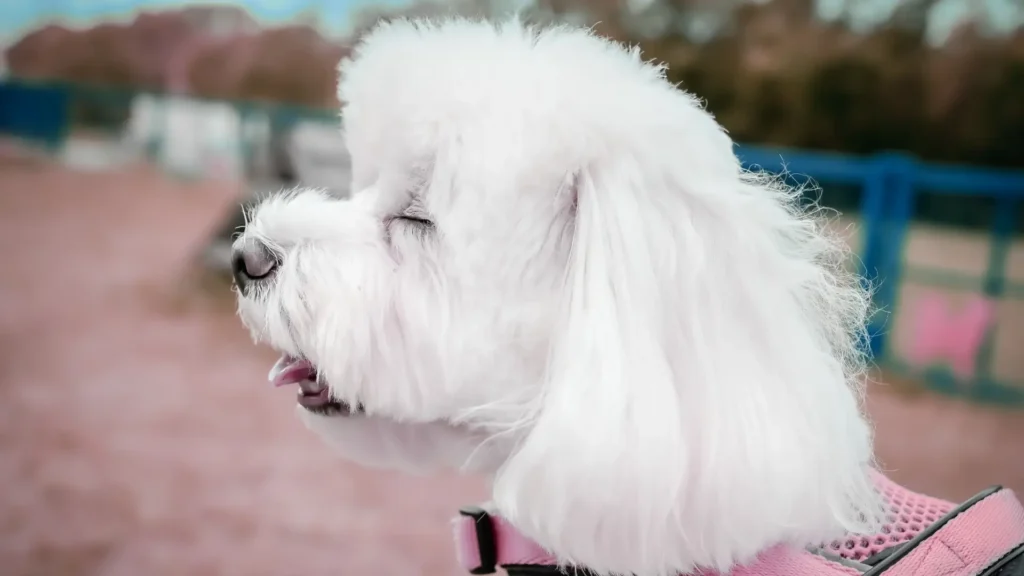
Before we dive into the potential causes, it’s crucial to become a bit of a detective. The specific sound your Maltese is making, along with their body language, provides vital clues. Is it a dry, hacking cough? A wet, phlegmy one? Or is it that truly peculiar rapid inhalation that seems to defy logic? Pinpointing the nature of the episode is the first step toward finding a solution and easing your worries.
Let’s break down the common sounds you might hear:
- A Cough: This is a forceful expulsion of air from the lungs. It can sound dry and harsh, like a “honk,” or wet and productive, as if they’re trying to clear mucus. Coughing is a reflex to clear the airways of irritants, fluid, or mucus.
- A Gag or Retch: This often follows a cough. It’s the throat’s attempt to bring something up, though often nothing comes out. It can look like they are trying to vomit.
- A Reverse Sneeze: This is the great imposter and one of the most common reasons for a Maltese owner’s panic. It’s not a cough at all, but a rapid, forceful inhalation of air through the nose. The sound is a loud, snorting, or honking gasp that can last from a few seconds to over a minute.
A great tip we always give Maltese owners is to record the episode on your phone. Describing a sound to your veterinarian is difficult, but showing them a video can lead to a much faster and more accurate understanding of what’s happening.
Reverse Sneezing (Paroxysmal Respiration): The Most Common Culprit
Let’s start with the most likely, and thankfully least worrying, cause of that shocking sound: the reverse sneeze. Its official medical name is “paroxysmal respiration,” which simply means a sudden, abnormal way of breathing. While it can look and sound terrifying, for most Maltese, it’s a completely harmless and temporary event.
What Exactly is a Reverse Sneeze?
Imagine a regular sneeze—it’s a powerful, fast expulsion of air out through the nose to clear an irritant. Now, flip that. A reverse sneeze is a series of rapid, spasmodic, and noisy inhalations through the nose. This happens when the back of their throat (the nasopharynx) becomes irritated, causing a spasm in the soft palate.
During an episode, a Maltese will typically:
- Stand still, often with their legs spread apart.
- Extend their head and neck forward or upward.
- Their chest and abdomen will heave rapidly with each noisy gasp.
- Make a loud snorting, honking, or gagging sound (the “inspiratory stridor”).
To the uninitiated owner, it can look like your dog is choking, having a seizure, or is unable to breathe. It’s an alarming sight, but it’s important to remember that air is still moving, just in a noisy, inefficient way for a few moments.
Why Are Maltese So Prone to Reverse Sneezing?
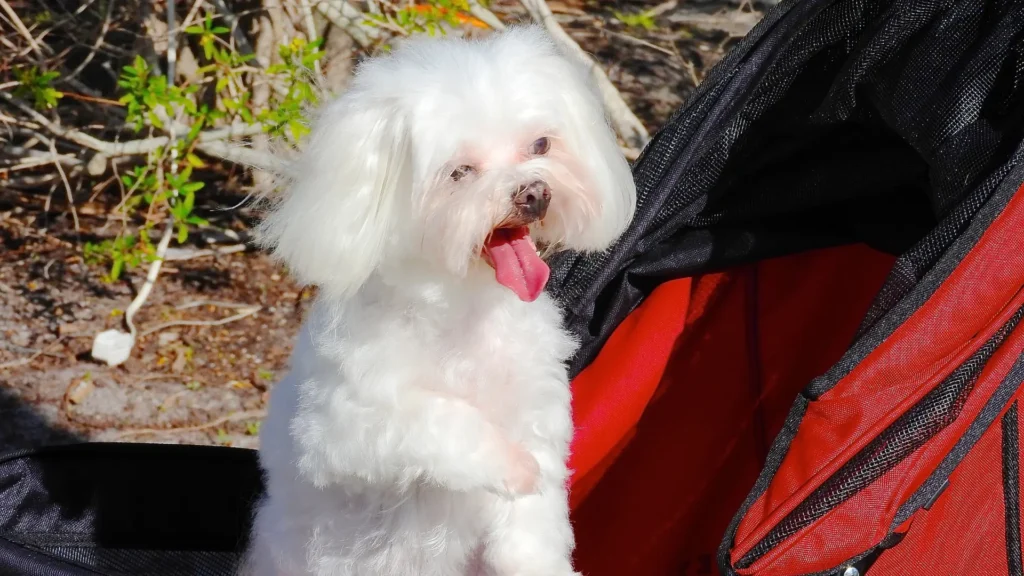
Small and toy breeds are the poster children for reverse sneezing, and the Maltese is no exception. Their charmingly compact anatomy is a primary factor. They have small nasal passages and a relatively elongated soft palate compared to the size of their mouth. This combination means that even minor irritation can trigger the spasm that causes a reverse sneeze.
Common triggers for a reverse sneezing episode in a Maltese include:
- Excitement: Greeting you at the door, getting ready for a walk, or playtime can all lead to an episode.
- Environmental Irritants: Their little noses are low to the ground, making them susceptible to inhaling dust, pollen, household cleaners, perfume, air fresheners, or even smoke.
- Pulling on the Leash: Pressure on the throat from a collar can directly irritate the area and trigger a reverse sneeze.
- Eating or Drinking Too Quickly: Gulping down food or water can sometimes cause a bit to go “the wrong way,” leading to irritation.
- Sudden Temperature Changes: Moving from a warm house into the cold air can sometimes be a trigger.
- Post-Nasal Drip: Just like humans, dogs can get post-nasal drip from allergies or mild respiratory infections, which can irritate the soft palate.
Is Reverse Sneezing Dangerous?
In almost all cases, no. Reverse sneezing is not dangerous. It is a self-limiting condition, meaning it stops on its own. Your dog is not choking, and they are not in pain, though they may feel confused or anxious. The biggest danger often comes from the owner’s panic, which the dog can sense, making them more stressed.
What to Do During a Reverse Sneezing Episode
The number one rule is to stay calm. Your calm demeanor will reassure your Maltese that everything is okay. While the episode will pass on its own, there are a few gentle things you can do to help it resolve more quickly:
- Gently Stroke Their Throat: Rubbing the neck area in a downward motion can help encourage them to swallow, which can stop the spasm.
- Cover Their Nostrils: Briefly and gently cover their two nostrils with your fingers for a second or two. This forces them to swallow, which is often an effective “reset” button for the soft palate.
- Blow Softly in Their Face: A gentle puff of air towards their nose can also make them swallow reflexively.
- Offer a Drink of Water: The act of drinking can help clear the irritation.
- Change the Environment: If you suspect an irritant like dust or perfume is the cause, calmly lead your dog into another room or outside for some fresh air.
Most episodes are over within 30-60 seconds. Afterward, your Maltese should be completely normal, maybe shaking their head once or twice before trotting off as if nothing happened. If the episodes become very frequent, last for many minutes at a time, or are accompanied by other symptoms, it’s time to talk to your vet to rule out underlying issues like allergies.
When It’s Not Reverse Sneezing: Other Causes of Coughing in Maltese
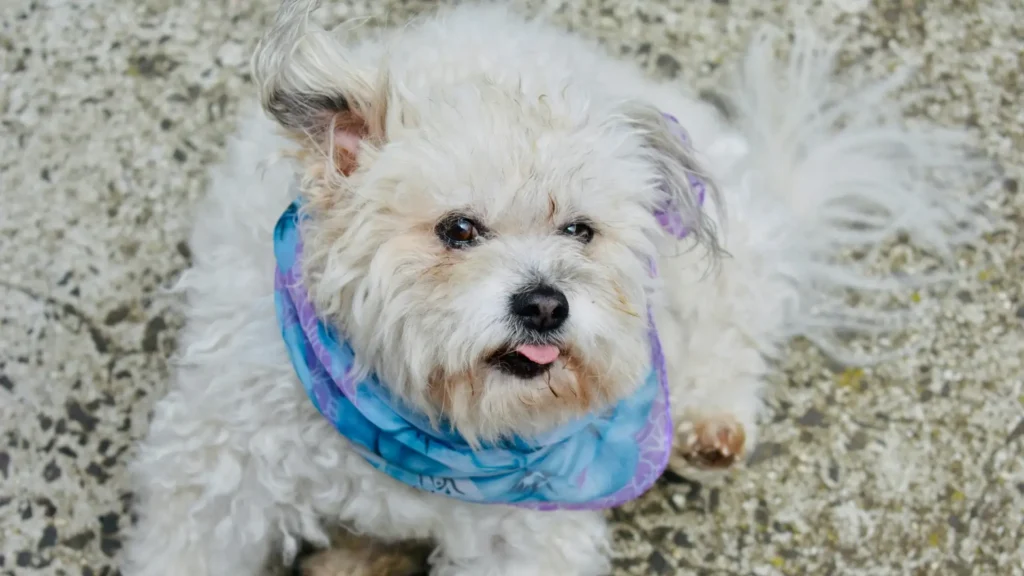
While reverse sneezing is common and benign, a true cough can sometimes signal a more serious health concern. It’s vital for Maltese owners to be aware of these other possibilities, especially if the sound is a persistent, true cough rather than the gasping of a reverse sneeze.
Tracheal Collapse
This is a significant concern for many toy breeds, including the Maltese. The trachea, or windpipe, is a tube made of C-shaped rings of cartilage that carries air to the lungs. In tracheal collapse, these cartilage rings weaken and lose their rigidity, flattening when the dog breathes. This narrowing of the airway causes a very distinctive cough.
The Sound: The hallmark of tracheal collapse is a dry, harsh, “goose honk” cough. It’s often triggered by excitement, exercise, heat, or pressure on the neck from a collar. The coughing fits can be severe and end with a gagging or retching motion.
Diagnosis and Management: A veterinarian can often make a preliminary diagnosis based on the breed and the characteristic cough. X-rays can help confirm the collapse. Management is key and often involves:
- Using a Harness Exclusively: This is non-negotiable for any Maltese, but especially one with tracheal collapse. A collar puts direct pressure on the windpipe and can trigger or worsen the condition.
- Weight Management: Excess weight puts more pressure on the chest and neck, exacerbating the collapse.
- Avoiding Irritants: Smoke, dust, and strong scents can trigger coughing fits.
- Medication: Vets may prescribe cough suppressants, bronchodilators to open the airways, or steroids to reduce inflammation.
- Surgery: In severe cases, surgical procedures to place stents or prosthetic rings can be considered.
Kennel Cough (Infectious Tracheobronchitis)
Just like kids bring home colds from school, dogs can pick up kennel cough from social situations. It is a highly contagious respiratory infection caused by a mix of viruses and bacteria (most commonly the Bordetella bronchiseptica bacterium). Your Maltese can catch it at the dog park, groomer, training class, or boarding kennel.
The Sound: Kennel cough causes a forceful, persistent, dry, hacking cough. It can sound like your dog has something stuck in their throat, and coughing fits often end with a gag or the production of a small amount of white foam.
Other Symptoms: Besides the cough, you might notice sneezing, a runny nose, or watery eyes. In most cases, the dog remains bright and active with a normal appetite. However, in puppies, senior dogs, or those with other health issues, it can progress to pneumonia.
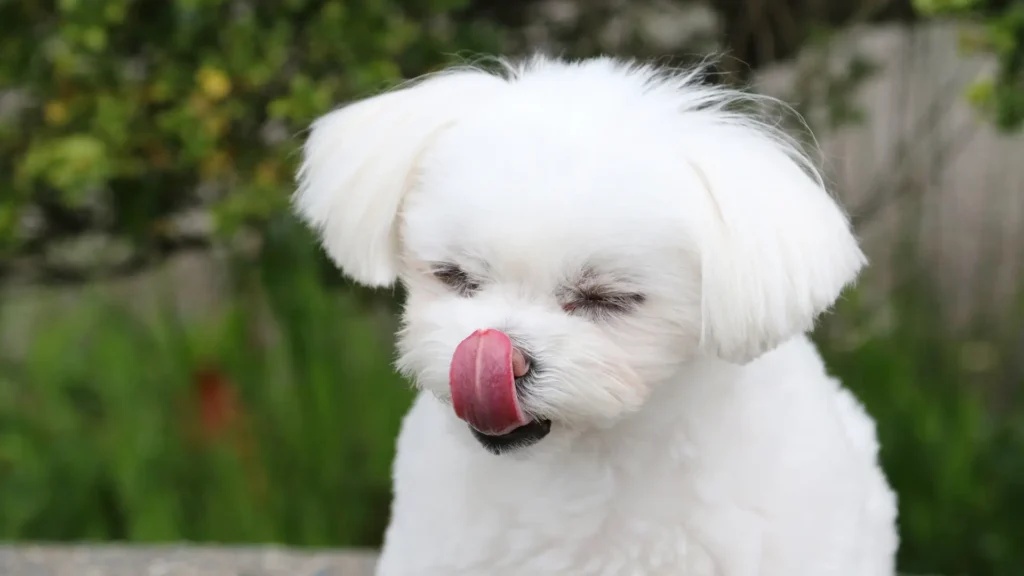
Diagnosis and Management: A vet usually diagnoses kennel cough based on the symptoms and the dog’s history of recent social exposure. Most mild cases resolve on their own within one to three weeks. Your vet might recommend rest, using a humidifier, and keeping your dog isolated from other dogs. In more persistent cases, they may prescribe cough suppressants or antibiotics to prevent secondary bacterial infections.
Allergies
Maltese can suffer from environmental allergies, just like we do. Inhaled allergens like pollen, grass, mold spores, and dust mites can irritate the respiratory tract and lead to coughing.
The Sound: An allergy-related cough can be dry or slightly moist and is often accompanied by other signs of allergies. Think of it as canine hay fever. You might also notice sneezing, wheezing, watery eyes, a runny nose, and—very commonly—itchy skin, ear infections, or paw licking.
Diagnosis and Management: Identifying the specific allergen can be tricky. Management focuses on reducing exposure. This could mean using a high-quality air purifier, washing your dog’s bedding frequently in hot water, wiping their paws and coat after they come inside, and avoiding walks during high pollen counts. Your veterinarian can prescribe antihistamines or, for more severe cases, corticosteroids or other allergy medications.
Heart Disease
This is one of the most serious potential causes of coughing in dogs, particularly in older Maltese. Conditions like Mitral Valve Disease are common in small breeds. As the heart becomes enlarged and less efficient at pumping blood, fluid can back up into the lungs (congestive heart failure). The enlarged heart can also physically press on the trachea and bronchi.
The Sound: A heart-related cough is typically soft and persistent. It is often worse at night or when the dog is lying down, and it may be triggered by exertion.
Other Symptoms: This is a critical distinction. A heart cough is rarely an isolated symptom. Look for other red flags like tiring easily on walks (exercise intolerance), increased breathing rate even at rest, difficulty breathing, a swollen abdomen, pale or blue-tinged gums, and sometimes fainting spells. If you notice a persistent cough combined with any of these signs, you must see a vet immediately.
Diagnosis and Management: A veterinarian will listen to your dog’s heart and lungs, likely recommending chest X-rays and an echocardiogram (an ultrasound of the heart) for a definitive diagnosis. While heart disease is not curable, it can often be managed very effectively for a long time with medications that help the heart pump more efficiently and reduce fluid buildup.
Pneumonia
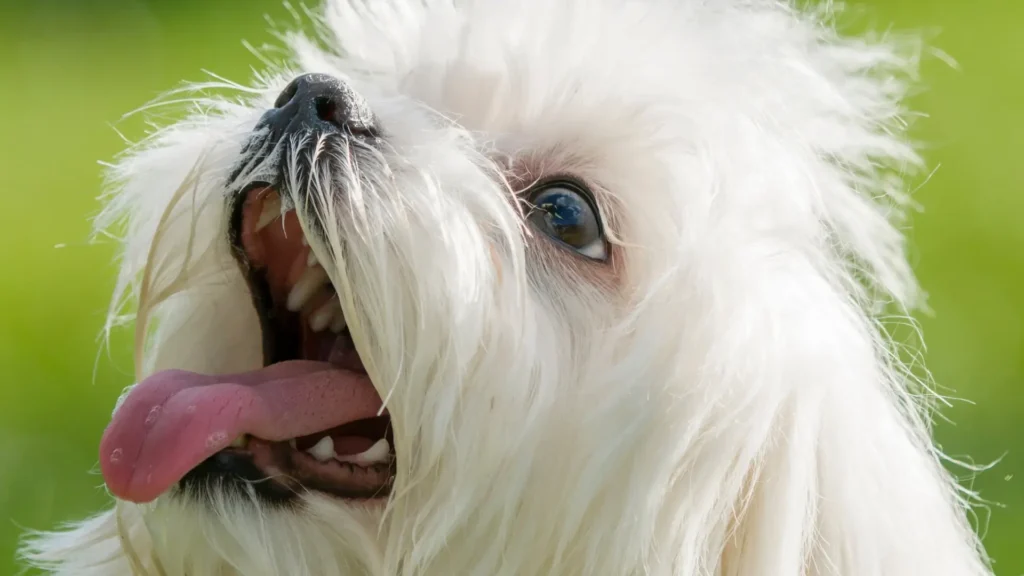
Pneumonia is an infection and inflammation of the air sacs in the lungs, which may fill with fluid or pus. It can be caused by bacteria, viruses, or fungi. Aspiration pneumonia, caused by inhaling foreign material like food, vomit, or liquid, is also a risk, especially in dogs with other underlying conditions.
The Sound: The cough associated with pneumonia is typically deep, moist, and “wet” or productive. You may hear rattling in the chest when they breathe.
Other Symptoms: A dog with pneumonia is clearly unwell. They will typically be lethargic, have a fever, lose their appetite, and show difficulty breathing (rapid, shallow breaths). This is a serious medical condition requiring prompt veterinary care.
Diagnosis and Management: Diagnosis involves a physical exam, listening to the chest, and chest X-rays. Treatment usually requires antibiotics, and in severe cases, hospitalization for oxygen therapy, intravenous fluids, and supportive care.
Something Stuck in the Throat (Foreign Object)
If the coughing and gagging start very suddenly while your Maltese is eating, chewing on a toy, or playing with something small, there is a possibility they have something lodged in their throat. This is an emergency.
The Sound: This will be a sudden, violent onset of gagging, retching, and coughing. Your dog will be in obvious distress. They may paw at their mouth, drool excessively, and have trouble breathing. If the airway is fully blocked, they will be unable to make any sound at all and may collapse.
What to Do: Carefully open their mouth to see if you can spot and remove the object with your fingers or tweezers, but be extremely careful not to push it further down or get bitten. If you cannot remove it easily or if your dog is struggling to breathe, you need to perform the Heimlich maneuver for dogs and get to an emergency vet clinic immediately.
Proactive Steps to Protect Your Maltese
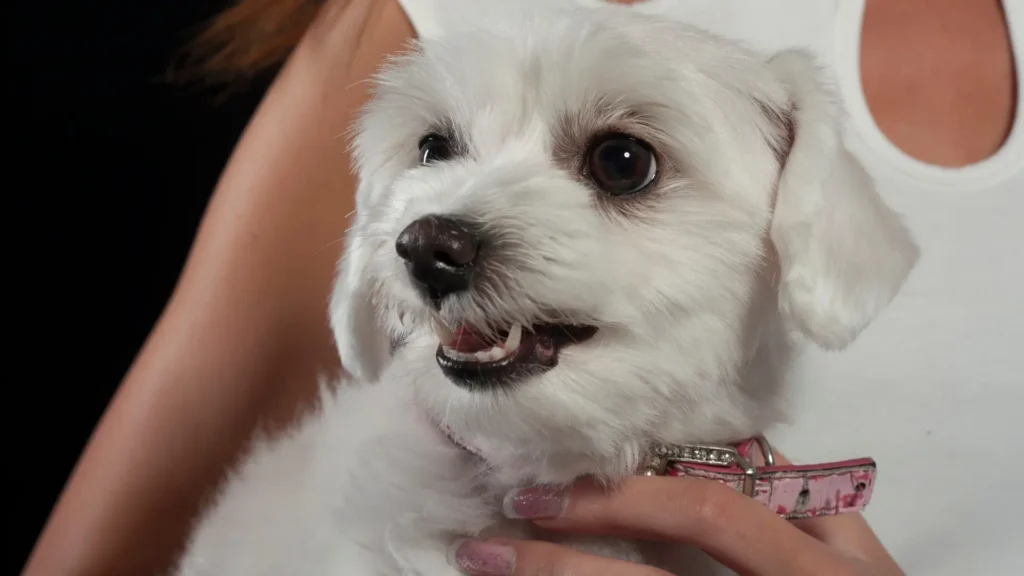
While you can’t prevent every cough or reverse sneeze, you can take several proactive steps to minimize the risks and support your Maltese’s respiratory health.
- Always Use a Harness: We cannot stress this enough. A harness distributes pressure across the chest and shoulders, completely avoiding the delicate throat and trachea area. Make the switch today.
- Maintain a Healthy Weight: Obesity is a major contributing factor to both tracheal collapse and heart disease. Keeping your Maltese lean reduces stress on their entire body.
- Create a Clean Air Environment: Don’t smoke or vape indoors. Avoid strong-smelling candles, air fresheners, and harsh cleaning chemicals. Use a HEPA air purifier, especially during allergy season, and vacuum regularly to control dust.
- Supervise Chew Time: Always provide size-appropriate toys and chews, and supervise your Maltese to ensure they don’t break off and swallow small, hazardous pieces.
- Keep Vaccinations Current: Ensure your dog is vaccinated against kennel cough (Bordetella), especially if they are social with other dogs.
- Schedule Regular Vet Check-ups: Annual or semi-annual wellness exams allow your vet to listen to your dog’s heart and lungs, catch potential problems early, and offer tailored advice for your specific dog.
When to Call the Veterinarian Immediately
While a reverse sneeze or an occasional mild cough may not be an emergency, certain signs should never be ignored. Contact your vet or an emergency clinic right away if you observe any of the following:
- Difficulty Breathing: Gasping for air, rapid shallow breathing, or stretching the neck out to breathe.
- Blue or Pale Gums: This indicates a lack of oxygen and is a critical emergency.
- Constant or Worsening Cough: A cough that doesn’t let up or is increasing in frequency or severity.
- Collapse or Fainting: Any loss of consciousness.
- Extreme Lethargy: Your dog is listless and unresponsive.
- Loss of Appetite or Refusal to Drink: Especially when combined with a cough.
- Coughing up Blood or Yellow/Green Phlegm: This can indicate a severe infection or other serious issues.
- High Fever: Your dog feels unusually warm to the touch.
Conclusion
Hearing your beloved Maltese cough or gag can be deeply unsettling, but knowledge is power. More often than not, that frightening honking sound is a harmless reverse sneeze, a strange quirk of their small but mighty anatomy. By learning to identify its unique sound and posture, you can remain calm and help your furry friend through the brief episode.
However, it’s equally important to recognize the signs of a true cough and understand the more serious conditions it could represent, such as tracheal collapse, kennel cough, or heart disease. Pay close attention to the type of cough and look for any accompanying symptoms. And remember the best advice any dog owner can follow: when in doubt, consult your veterinarian. They are your best partner in ensuring your Maltese lives a long, happy, and healthy life.
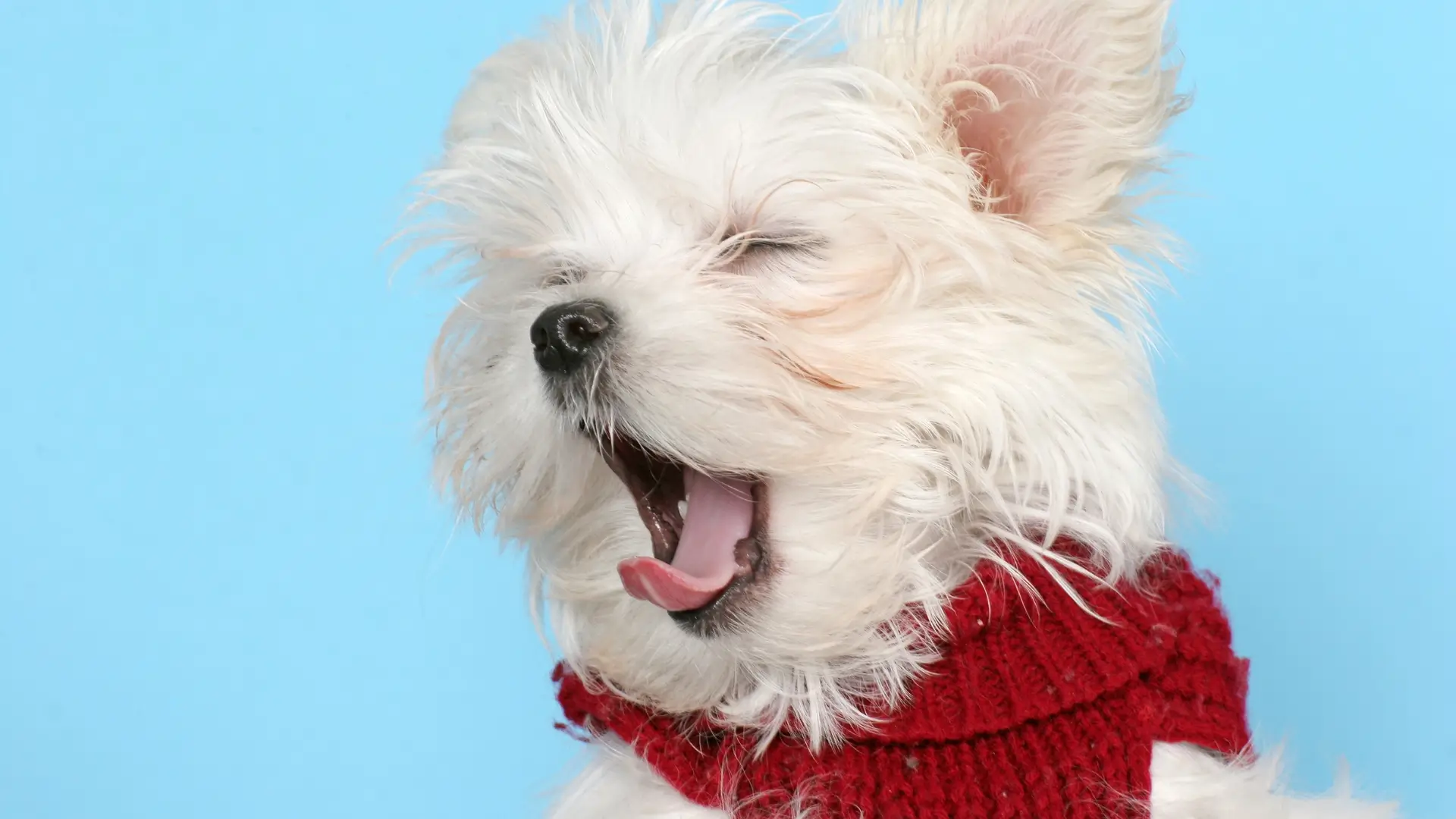
Leave a Reply